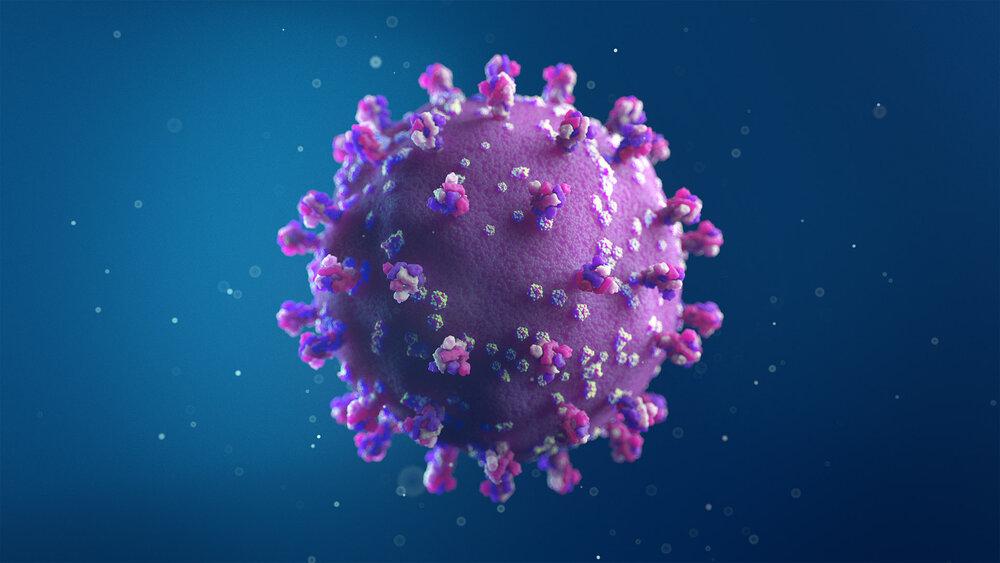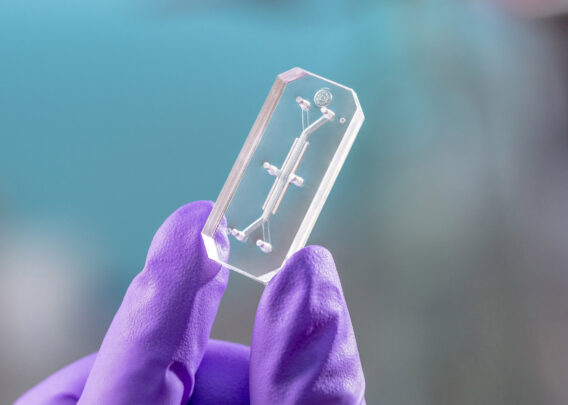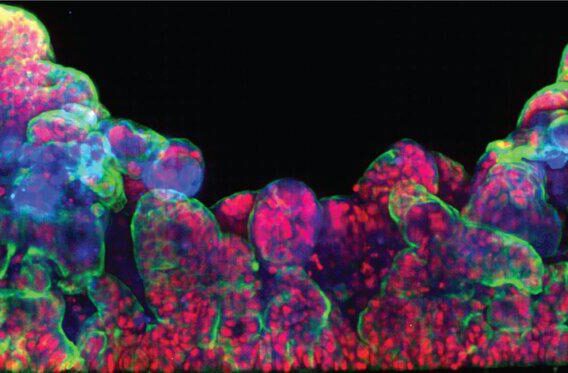Emulate is proud to be playing an important role in establishing accurate in vitro SARS-CoV-2 models using our Lung-Chip platform.
Organ-Chips Aid in Search for a COVID-19 Vaccine
The research community and biopharmaceutical industry have mobilized with unprecedented speed against the COVID-19 pandemic. While significant progress has been made in the development of vaccines and new therapeutics, there is still much to learn about the intricacies of how SARS-CoV-2 interacts within the human body, including dramatic differences in how individuals respond to this infection. Unraveling the complexities of COVID-19 requires a multidisciplinary approach and the convergence of leading-edge human-relevant technologies. Emulate is proud to be playing an important role in understanding SARS-CoV-2 using our Organs-on-Chips technology platform.
Notably, Emulate has entered into a research collaboration with the FDA where our Lung-Chip will be used to evaluate the safety of COVID-19 vaccines and protective immunity against the virus. This study will be led by the FDA’s Center for Biologics Evaluation and Research (CBER) and will seek to address one of the most critical questions regarding protective immunity: why individuals experience a wide spectrum of disease severity and what constitutes protection against future infection.
Organ-Chips provide a window into human biology, and our Lung-Chip is opening a panoramic view of how, where, and why SARS-CoV-2 infects the human body. With our new technology, we are able to bring better, rapid insights about human disease and more quickly and precisely predict human response to medicines.
This project is one of several COVID-related initiatives being conducted using our Organ-Chips, particularly our Lung-Chip, to better understand the mechanisms and disease process of SARS-CoV-2 infection. Organ-Chips are integrated within our Human Emulation System®, and they are living, microengineered environments that recreate the natural physiology and mechanical forces cells experience within the human body. Organ-Chips provide a window into human biology, and our Lung-Chip is opening a panoramic view of how, where, and why SARS-CoV-2 infects the human body. With our new technology, we are able to bring better, rapid insights about human disease and more quickly and precisely predict human response to medicines.
Here’s a snapshot of how collaborators and researchers are applying our advanced Organs-on-Chips platform to unravel the mysteries of SARS-CoV-2.
- FDA awarded a new research contract to the University of Liverpool and global partners to sequence and analyze samples from humans and animals to create profiles of various coronaviruses, including SARS-CoV-2, which causes COVID-19. The study will also examine in vitro coronavirus models, such as Organs-on-Chips. This regulatory science project, awarded in collaboration with the National Institutes of Health, National Institute of Allergy and Infectious Diseases (NIH/NIAID), will hopefully help inform development and evaluation of medical countermeasures for COVID-19. This project will use the Emulate Lung-Chip.
- Queen Mary University of London is using the Emulate Lung-Chip for COVID-19 research by Prof. Daniel Pennington to understand the mechanisms of vascular dysfunction in severe cases of COVID-19. Emerging data show there is an early vascular component of COVID-19 where the endothelial cells lining blood vessels are disrupted. The unique epithelial-endothelial interface of our Lung-Chip makes this the most suitable model system for studying this aspect of COVID-19. Specifically, the Lung-Chip will be used to study the effect of plasma from healthy individuals and those with severe infections on endothelial cell function. Results from the study will further our understanding of why some individuals show greater disease susceptibility and will help in identification of new therapeutic targets.
- École Polytechnique Fédérale de Lausanne (EPFL), under the direction of Dr. Vivek Thacker, is leading a project to use the Emulate Lung-Chip to model the individual steps in how SARS-CoV-2 attacks the lungs. In his initial findings, the unique epithelial-endothelial interface of the Emulate chip has enabled discovery of a driver of vascular damage. Following the addition of SARS-CoV-2 to the Lung-Chip, the virus first attacks epithelial cells and within a day, reaches the inner layer of endothelial cells. These infected endothelial cells produce high levels of IL-6, suggesting vascular damage is directly caused by endothelial infection, and only exacerbated by immune-mediated cytokine storms.
- Leiden University Medical Center researchers are conducting a research program using the Emulate Lung-Chip to study the lung epithelium, the main cell type infected by SARS-CoV-2, and to develop a Fibrosis Lung-Chip. The team will investigate how epithelium obtained from different respiratory locations, from nose to alveoli, respond to SARS-CoV-2 infection to better understand how the current coronavirus infects the respiratory tract and leads to long-term lung damage.
- As part of the World Health Organization’s (WHO) Research and Development Blueprint response to the COVID-19 outbreak, the Emulate Lung-Chip was used to provide preclinical insights on the efficacy of hydroxychloroquine for COVID-19, with results currently on BioRxiv. Therapeutic candidates for many types of diseases may appear to show efficacy in conventional cell cultures which cannot be replicated in more complex, physiologically-relevant in vitro models. The same held true for a study of hydroxychloroquine. Within vero cell culture, hydroxychloroquine appeared to demonstrate anti-viral properties; however, when evaluated in the Lung-Chip, these in vitro effects were not observed.
Our team at Emulate is proud to collaborate with and support leading institutions and visionary researchers around the world to advance our understanding of COVID-19. This pandemic has created an “all hands-on deck” imperative. By coming together and sharing our expertise, we will be in the best position to emerge from this pandemic more rapidly and with a wealth of insight that can be applied to the next infectious disease threat that emerges.




